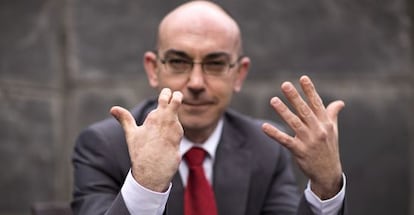Fighting their way back to the office
More than 3.7 million people in Spain have a disability caused by accident or illness Returning to work can be a huge challenge, but is the best solution, say experts


Jesús Hernández’s right hand is an anatomical anomaly. Nine years ago, when he was 33, he smashed it while using a machine at the metal works where he was employed as a foreman. A few days later, surgeons amputated four fingers and half his palm. But now two miracles – the second and third toes of his right foot – grafted on to what remains of his hand have given him back near-normal use, allowing him to write, paint, and even tie his shoelaces, tasks he thought he would never perform again.
The accident prevented him from returning to his job as an industrial engineer. After lengthy rehabilitation, his disability was recognized by the state and he was given a small but adequate pension. Jesús could have resigned himself to never working again for fear of losing his pension, but his insurance company, Ibermutuatmur, offered him the chance to take a post-graduate qualification in industrial risk management, and he decided to take the opportunity to restart his career.
Most of these people are unable to return to their former job, but they could do something else” Olga Navarro of FSC Inserta
Today, he heads the risk prevention division of the Mapfre Foundation, the insurance company’s corporate social responsibility organization. He still describes himself as a “grease monkey” and says he at first found adapting to his new life in an office difficult, but he now takes enormous satisfaction from helping prevent other people suffering the same kind of life-changing accident that affected him: “It’s as though life has given me a second opportunity.”
There are around 3.78 million registered disabled people in Spain. Around 10 percent of them were injured in accidents, and around 70 percent are disabled because of illness – the rest are due to other reasons, according to National Statistics Office data. Of the total, around 930,000 have complete or partial disability that prevents them from working.
“Most of these people are unable to return to their former job, but they could do something else,” says Olga Navarro of FSC Inserta, which was set up by Spain’s ONCE national blind association to train people with disabilities. “If only businesses would try to understand the problems their employees face and help find them new jobs, but they rarely do. In our experience, this only happens in large companies that tend to have had a good relationship with a worker,” she says.
People who suffer severe head injuries that cause brain damage almost never return to work. But those without long-term serious effects soon want to. Manolo Trujillo, a Spaniard who ran the psychiatric ward at New York’s Bellevue Hospital for several years, believes that the demands of work help “as much or more,” in rehabilitating people with brain damage and that they should return to work as soon as possible.
Álvaro Bilbao, a neuropsychologist at the State Reference Center for Cerebral Damage Attention (Ceadac), adds: “First, because it helps people get their lives back and second, because we all want to feel of some use to society,” he says.
Another reason for returning to work is that disability pensions in Spain are rarely enough to live on. The average amount the state pays is €916 a month, while the maximum for somebody with major disabilities is €1,815; a person who is 55 percent disabled receives €585. But once somebody takes a job, they typically lose their pension. Valeriano García, director of the Spanish Brain Damage Federation, says a new approach is needed that allows people to return to work while retaining a pension: “Greater compatibility is required, because people don’t want to risk losing their pension.”
Just four months after he suffered an aneurysm, 35-year-old Miguel Cendrero was back working at the small business he had set up himself. He spent six weeks in hospital – the first 10 days in a coma – and was then sent to the Ceadac. He made a full recovery, but says he was very uninhibited after he was discharged, and would say whatever came into his mind. “It was like I was drunk,” he remembers. What’s more, he lost his self-confidence. But despite the difficulties, he turned down the chance of a pension: “It would have been like accepting that I was no longer of any use.”
He says he had long conversations with himself in front of an empty chair in the psychologist’s office at Ceadac. He needed to regain his self-confidence and to see something positive in what had happened to him. Today, he explains that he suddenly realized that there is no guarantee anybody will make it to the age of 75. He was leaving too many things to do later in life. As a result of his accident, he says, he was imbued with a new sense of urgency, and decided to make major changes. He hired a friend to run his company and took some time off, heading for Ireland, where he eventually found a job with Microsoft. “It’s funny: I never wanted to have a boss, and I was very happy with my company, but now I find it’s really good to have somebody above me. Being anonymous in Ireland has really helped me. I needed to pick up the pieces of my life.”
Accepting a disability pension would have been like accepting that I was no longer of any use” Miguel Cendrero, who returned to work after suffering an aneurysm
Javier Catalán was 21 when a diseased poplar tree fell on to his car, causing him severe head injuries. Emergency rescue teams used saws to cut open the vehicle, and then flew him more than 200 kilometers by helicopter to a specialist unit in a Toledo hospital. Two-and-a-half years after the accident, he still retains a passion for motorbikes and movies. Over the last year he has attended two film editing courses, and constantly uploads his work to the internet. For the moment he is working alone, but says he would like to join a team. He lost his voice as a result of the accident, but has been in rehab to try to regain some use of his vocal chords, although for the moment he says he hates hearing himself speak. During our conversation he covers his eyes and says slowly: “damned tree.”
After a year in the Cedeac, which is part of Spain’s public health service, his parents are now having to pay for further rehabilitation. Three times a week his father drives him the 150 miles from the family home in Molina de Aragón, northeastern Spain, to the city of Guadalajara, where Javier is treated at the Nipace Foundation. His therapists are working on his speech, but progress is slow. In the meantime, he’s able to use his iPhone to communicate by text messaging.
Javier receives a small pension for his disability, but it’s not enough to allow him to live on his own. And if he were to find work as a film editor, he would have to give up his pension, but would be more than happy to do so.
“When I was working I was very happy,” says Javier by email. “I used to meet people, I had my own money, and I felt alive.” He says he draws inspiration from his father, who was struck down by polio when he was a child, but made a life for himself. “He never gave up,” says his son. “He has shown me the importance of being strong and moving forward in life.” That said, he knows it’s not going to be easy to find work. “I know: I see my friends who have no physical limitations, and they can’t get a job. With my speech impediment my options are even more reduced… But I hope the moment will come.”
Tu suscripción se está usando en otro dispositivo
¿Quieres añadir otro usuario a tu suscripción?
Si continúas leyendo en este dispositivo, no se podrá leer en el otro.
FlechaTu suscripción se está usando en otro dispositivo y solo puedes acceder a EL PAÍS desde un dispositivo a la vez.
Si quieres compartir tu cuenta, cambia tu suscripción a la modalidad Premium, así podrás añadir otro usuario. Cada uno accederá con su propia cuenta de email, lo que os permitirá personalizar vuestra experiencia en EL PAÍS.
¿Tienes una suscripción de empresa? Accede aquí para contratar más cuentas.
En el caso de no saber quién está usando tu cuenta, te recomendamos cambiar tu contraseña aquí.
Si decides continuar compartiendo tu cuenta, este mensaje se mostrará en tu dispositivo y en el de la otra persona que está usando tu cuenta de forma indefinida, afectando a tu experiencia de lectura. Puedes consultar aquí los términos y condiciones de la suscripción digital.








































